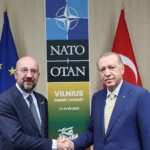As Spain prepares for early legislative elections, it takes over the rotating presidency of the European Union. A telescoping agenda that can be favorable both for Prime Minister Pedro Sanchez and for Spain’s strategic allies, including Morocco. These early Spanish elections were called by the Prime Minister following the latest disappointments of his alliance in local elections.
The right-wing opposition is given favorable to return to power. But the hasty timing of their organization can be a game-changer and cause unexpected results. For many, the presidency of the European Union is likely to give Pedro Sanchez a visibility, aura and exposure that would guarantee him an edge over his competitors. Sanchez can take advantage of the European showcase to try to convince the Spaniards to restore their confidence in him, or at least to put the possible triumph of the right into perspective.
For Morocco, that Pedro Sanchez, the Spanish politician who assumed his country’s turn on Morocco’s sovereignty over the Sahara, can chair the European Union is quite promising news. At the very least of his action, he could, through his convictions and his choices, create a much more favorable European atmosphere in Morocco. The vital Spanish interests which dictated this choice merge with the interests of the European Union as a whole. It is true that the Spanish Prime Minister will not be able to impose a general clarification of the positions of the countries of the Union with regard to Morocco, knowing that this kind of decision requires discussion and a vote by the European authorities, but he can suggest , show all the interests that the European Union could achieve if it imitates the Spanish example.
Moreover, one of the expected logics of the Spanish approach is to convince those who still doubt that there is no other way out of this regional crisis than under Moroccan sovereignty. This kind of approach, which creates a favorable atmosphere in Morocco, can help the hesitant and the recalcitrant to get out of the gray and comfort zone regularly denounced by Morocco. With regard to the Maghreb regional group, the Spanish presidency is also likely to shed harsh light on the real reasons for its crisis with the Algerian regime. No doubt also to denounce the strategy of blackmail practiced by Algiers against Madrid to force it to renounce its sovereign decision to recognize the sovereignty of Morocco over its Sahara.
The crisis between the two countries was such that it risks precipitating serious questioning. European countries have already shown unwavering solidarity with Spain in its showdown with the Algerian regime. Blackmailing the economy, gas and illegal immigration has left a very bad effect on European governments. This impression was confirmed by Algerian President Abdelmadjid Tebboune’s last visit to Moscow, where he spectacularly put himself under the protection of Vladimir Putin. Algiers therefore openly assumes its role as financier of the Russian war machine in Ukraine, even if it means posing a major security challenge to both Europeans and Americans, all of whom are deeply committed to preventing Russian victory in this war in Ukraine.
From the very first days of its presidency of the Union, Spanish diplomacy has insisted on underlining Europe’s unfailing commitment to the Ukrainians. This automatically makes the Algerian regime an obstacle and an adversary to be contained by all means. In all these equations, Morocco played the winning bet. Allied with neighboring Spain, firm more than ever with hesitant France, straight in its boots with other European countries. This attitude and these choices will be highlighted during this Spanish presidency of the European Union.
It will therefore be easier to expect political accelerations favorable to Morocco than reversals or reconsiderations. In other words, the Spanish presidency will serve to oil the political dialogue between Morocco and the European institutions to definitively bury what today looks like an artificial conflict, voluntarily maintained to serve domestic agendas and regional interests.
This article is originally published on fnh.ma









